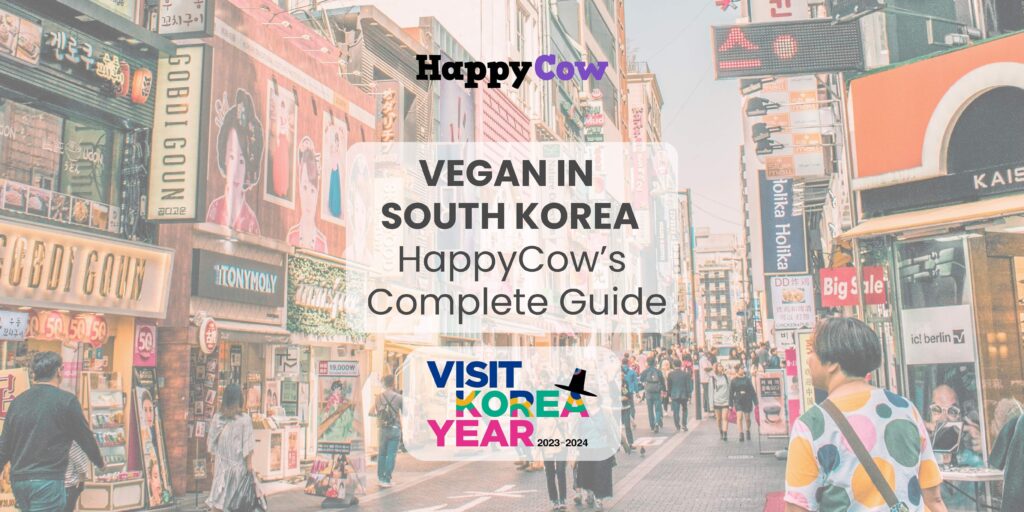
Perfect for the curious traveller, Korea offers a blend of timeless culture and a dynamic modernity. As a vegan in South Korea, there is so much to explore! Besides soaking in its stunning natural landscapes and exploring its rich cultural gems, experiencing the vegan food scene here can truly be an enthralling experience.
The traditional Korean diet was predominantly plant-based in its origin, especially within the Buddhist temples spread across the country. Well before veganism came to be widely recognised as essential for the planet’s wellbeing, many cultures had already been highlighting such practices. Korean temple cuisine, as a classic example, has always excluded meat and animal products, making way for a unique vegan culinary tradition. To date, this cuisine is still practised in temples all across this beautiful country. In such a context, cooking is seen as a spiritual practice and as an expression of devotion to nature.
Since Korean culture has such deep roots in Buddhism, this tradition manifests itself even today.
While we can’t deny that meat and seafood have become an established part of Korean culture and cuisine over time, it’s true that one can still find hundreds of traditional Korean eateries all across the country that offer exclusively vegan and vegetarian fare, as well as more western vegan establishments, bringing to this country a diversity of cuisine.
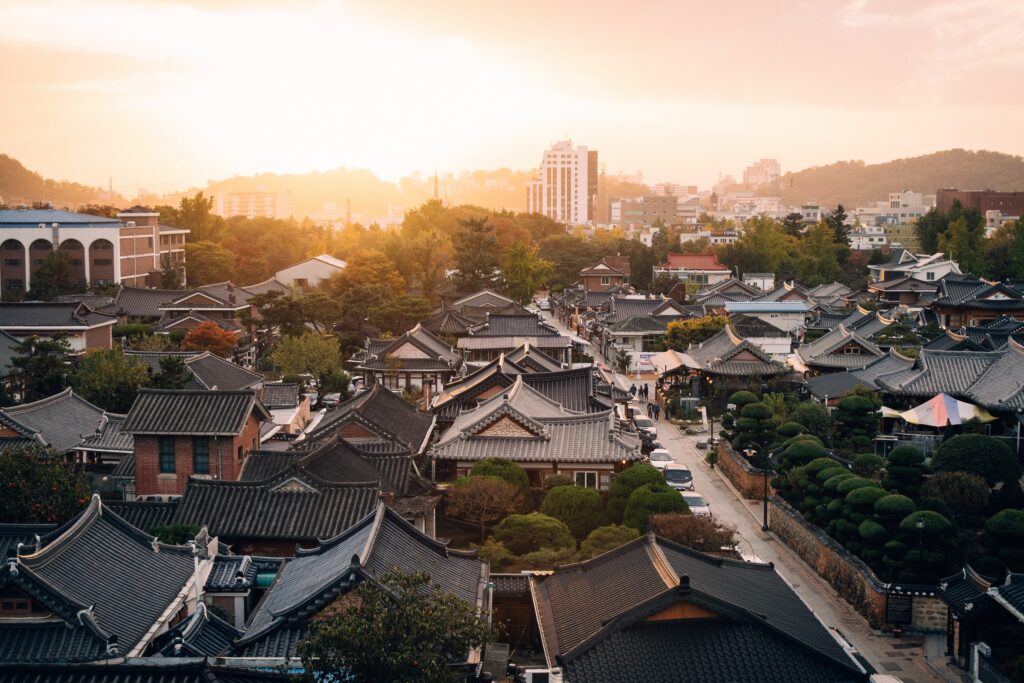
Curious to know more? Let’s dive in! This guide, brought to you in collaboration with KTO, is here to help you navigate various aspects of travelling as a vegan in South Korea! From vegan-friendly stays to vegan street food recommendations, must-try restaurants, and several tips and resources, we’ve got you covered!
Best Time of the Year to Travel to South Korea
The best time of year to visit South Korea is generally considered to be the spring months of April, May & June and the autumn months of September, October & November. During these two seasons, days are mostly sunny and dry with comfortable average temperatures.
Where to Stay as a Vegan in South Korea
Searching for a place to stay as a vegan in South Korea can seem daunting at first, but there are hidden gems and welcoming spots that cater specifically to plant-based lifestyles.
1. Stay with a Vegan-Friendly Host
For a smooth and effortless stay, we’ve got some top-notch suggestions for places specially catering to vegans and vegetarians.
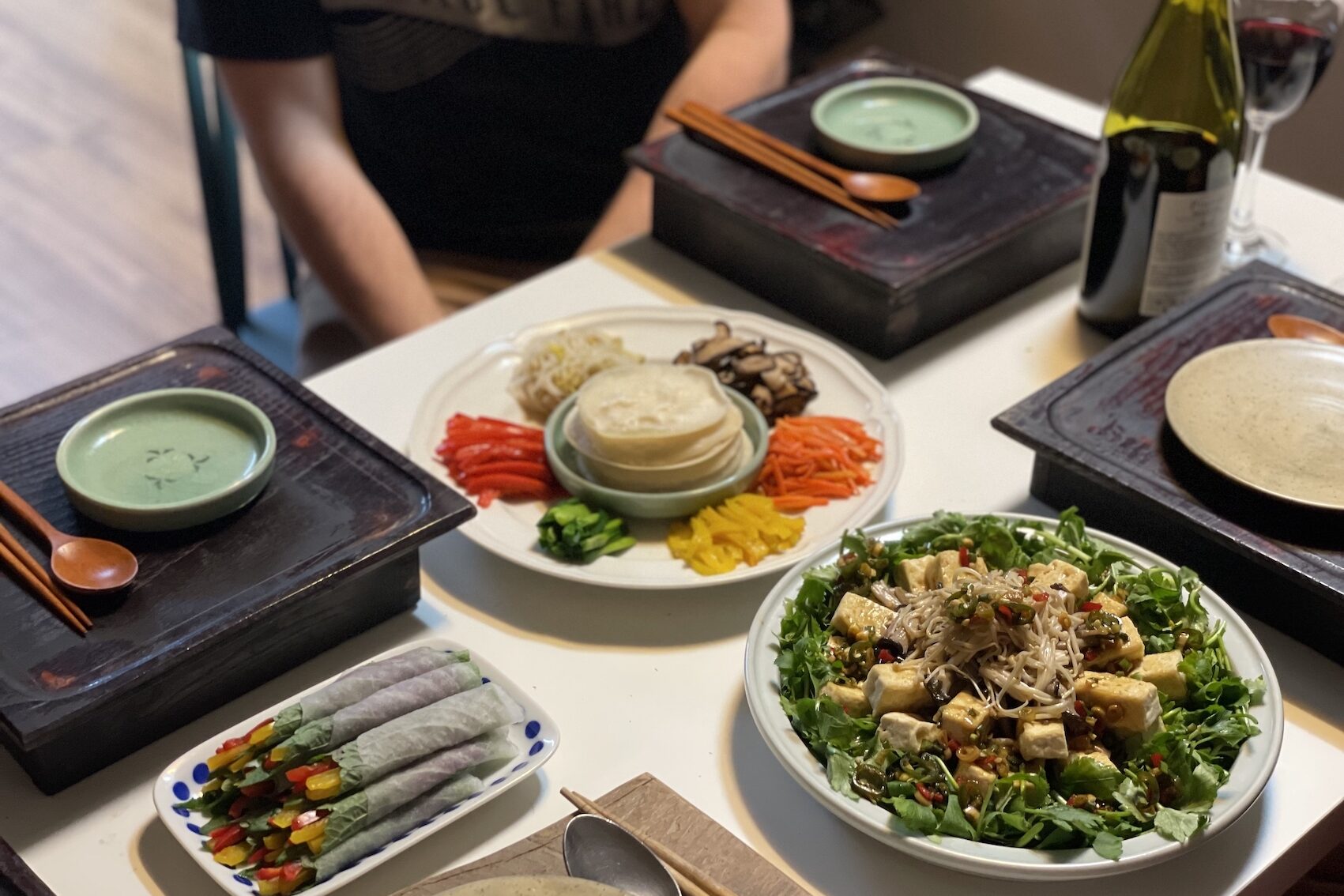
SEOUL
Grand Vegan Suite
The Grand Vegan Suites are dedicated VEGAN ROOMS in one of Seoul’s finest hotels, Grand Walkerhill. This hotel offers the nation’s first environment-friendly rooms devoted to vegans by excluding animal products from every part of the experience – from interiors to food and cosmetics. These rooms even come with a vegan minibar stocked with vegan drinks, snacks, and wine. Now that’s a full package!
Helen’s House
A sustainable, minimalistic house with 3 bedrooms, flexible check-in & check-out, and a resident cat! Helen’s House is located in a central area with many restaurants nearby. The owner, Helen, can also teach you how to cook vegan Korean food.
Sleeping Strawberry Guesthouse 잠자는딸기
This is a woman-only, eco-friendly accommodation located in Sinchon/Hongdae, the centre of youth culture in Seoul with lively local clubs and bars. Catering to vegan backpackers and travellers, this small and cosy homestay serves vegan meals upon request. The owner even hosts Korean vegan cooking classes along with a local market tour!
BUSAN
Vegan House
This is a homely apartment run by a vegan Airbnb Superhost! And it doesn’t stop there – she also owns a small, all-vegan market Vegan Mart – 비건마트, which is just a short walk away from the B&B.
2. Spend a Few Days at a Temple!
South Korean mountains are dotted with numerous Buddhist temples. People visiting this beautiful country often choose to immerse themselves in a Buddhist retreat, seeking the sense of calm and serenity evoked by the breathtaking landscapes.

These temples offer exclusively plant-based cuisine, making them a welcome haven for vegan travellers, especially in rural parts of the country where accessibility to vegan dining options is otherwise limited.
If you fancy a peaceful escape from normal life to experience the monastic life of Buddhist monks, then you can find all the details you need at Korea’s official Temple Stay website. While some temples only offer 1-2 day stays, many offer flexible durations of stay. If you are looking for longer stays, make sure to select “Free-Style Templestay” in the ‘Select Type’ drop-down menu.
To get you started, here are three notable temples to look into:
Beopjusa Temple
Nestled in the depths of Mt. Songnisan, Beopjusa Temple is one of the most astounding sites in Korea. The lush green landscapes of Songnisan National Park are made up of profoundly still mountains, holding a history of 1,500 years and numerous national treasures. This ancient temple is a UNESCO World Heritage Site, giving both local and foreign visitors access to the essence of Buddhism and Korean traditional culture. The humble yet breathtakingly pristine temple welcomes everyone with its wide-open doors. Spend anywhere from one to ten days here to immerse yourself in the raw simplicity and tranquillity of life here. Make sure to select the ‘Free-style Templestay’ if you wish to stay longer than two days.
Jinkwansa Temple
Sitting atop a mountain in Seoul’s Bukhansan National Park, this 12th-century Buddhist temple attracts high-profile visitors from around the globe particularly for the culinary wisdom that can be obtained here. Jinkwansa Temple is entirely woman-run. The nuns are masterful in their cuisine, epitomising the ancient art of Korean temple cooking. This place offers a one-day temple stay. The culinary experience here is characterised by an 18-dish feast comprising about 50 fruits, vegetables, roots, and leaves, as well as a tea ceremony.
Baekyangsa Temple
Considered to be the cradle of the modern Korean Buddhist Seon sect, this temple offers an opportunity for travellers to go within, letting nature be their guide. If you’ve ever watched the Chef’s Table episode featuring Jeong Kwan, the Buddhist nun with a deeply life-affirming approach to cooking, you know how magical this temple’s setting is, not to mention the fully plant-based food! From forest bathing to walking meditations and drinking tea and dining with the monks, the activities offered here give people the chance to step away from the intensity of normal life.
There are several other options here – these temple stay programs are specially catered to foreigners, as they offer guidance in English.
3. Volunteer at a Vegan-Friendly Workaway
Another way to immerse yourself in the local culture is by volunteering in exchange for stay! Especially great for budget travellers, Workaway is a platform that offers thousands of such opportunities around the world. In South Korea, there is currently only ONE Workaway opportunity that specifically invites vegans!
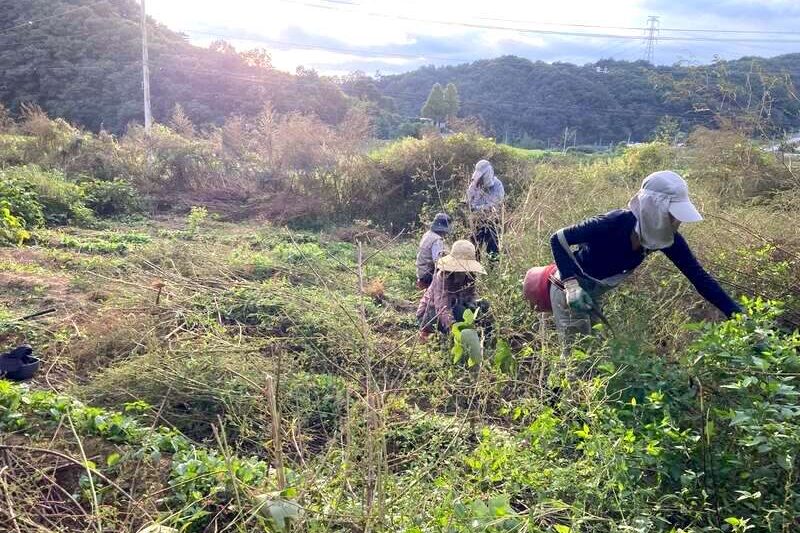
Here, you get to help with gardening and creating food forests while getting to know the life of a small village in Wonju, South Korea. Food served here is mostly vegan and no meat is allowed in their premises.
Here is a note from the hosts: “Hello! We are a group of four people – we are in our 30’s and all female – interested in permaculture, ecology, veganism, and rural lifestyles. We are starting an eco-community in a small village in Gangwon Province and we are looking for female workawayers who would enjoy staying with us. Learning opportunities include: Language exchange, Korean vegan food recipes, Korean rural life with young people.”
If this piques your interest, find more details here.
4. Stay at a Centrally-Located Airbnb with a Kitchen
If the monastic experience isn’t your thing and you are not necessarily looking to stay or volunteer with a vegan host, but you do like to cook your own meals while travelling, your options increase tenfold. In this case, we would highly recommend looking for any hostel or Airbnb with a kitchen so you have the option to get groceries from a supermarket and prepare simple meals to carry along when you go out exploring the city. It helps if the place is located in a busy and popular area. This way, you can easily walk over to vegan or vegan-friendly restaurants and stores that you find in the area using HappyCow!
Who to Book With
If you are the kind of traveller who likes the idea of outsourcing all the planning required for your trip, booking with a vegan tour operator is a sure shot way to ensure that everything from food to stay is taken care of!
Here are some all-inclusive vegan tours in South Korea planned for 2024.
Vegan Tour in October 2024
Organised by Vegan Tours NY
9-Day South Korea Vegan Food Adventure in September 2024
Organised by Green Earth Travel
Korean Vegan Tour in October 2024
Organised by Veg Jaunts & Journeys
What’s more? The Korea Tourism Organization itself has an upcoming vegan tour planned for 2024 – Take a look at the Seoul to Soul Vegan Journey by Sky Vacations.
Vegan-Friendly Experiences
Discover a variety of interesting activities that can be covered in a single day! Here is an array of options – from creative, hands-on workshops to traditional outings, there’s something for everyone.
1. Airbnb Experiences in Seoul
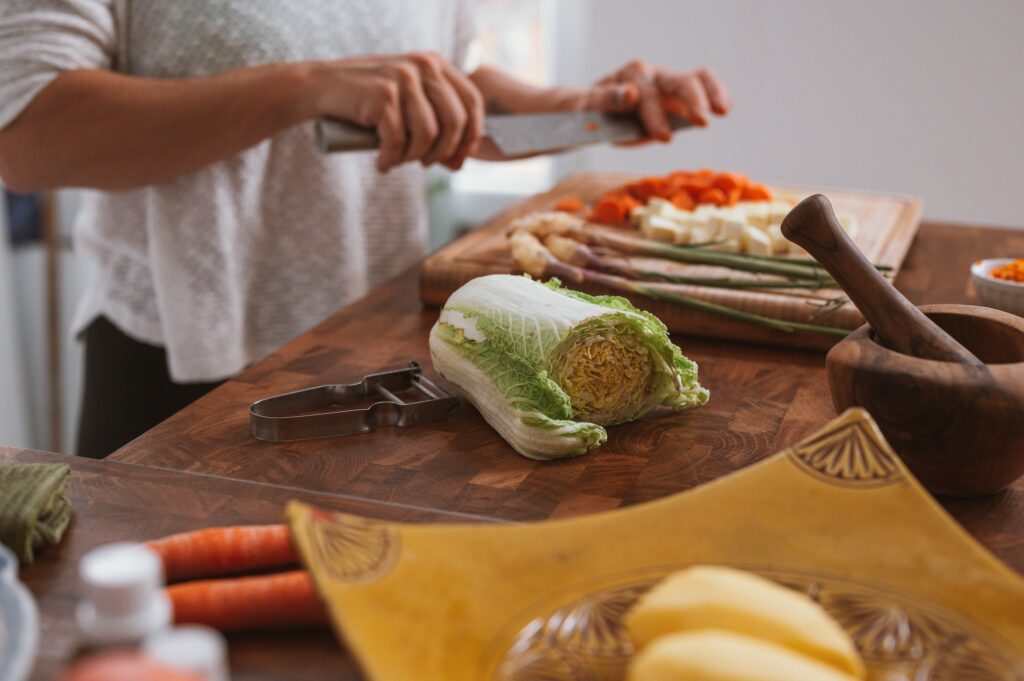
Check out some of these fun opportunities!
Explore Korean Vegan Culture with an Activist
Vegan & Zero-Waste Korean Cooking Class
Another vegan-friendly cooking class
Seoul Vegan Restaurant & Cafe guided tour
Handmaking Korean Vegan Cosmetics
2. Take a Day Trip to a Nearby Temple
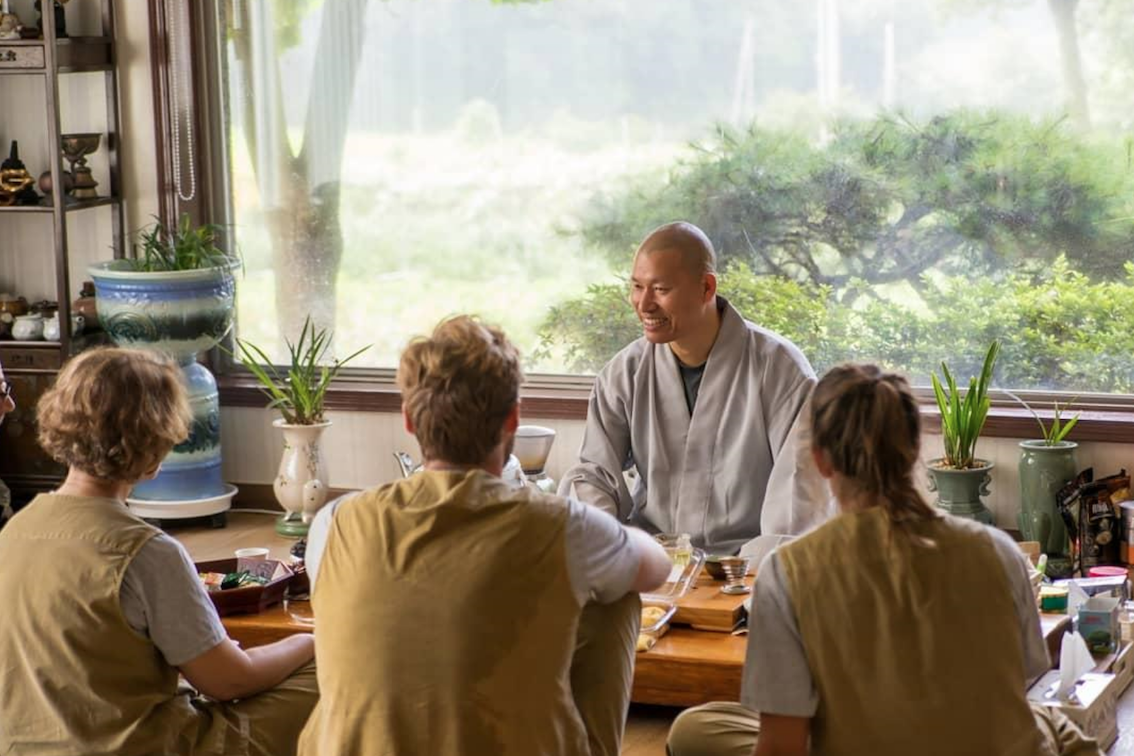
Several Buddhist temples in South Korea offer short cultural programs to visitors interested in experiencing the life of Buddhist monks. Participants can take part in their daily monastic activities and enjoy a delicious plant-based meal, often along with the monks. Some temples offer programs as short as 1 day, while others offer longer stays. Visit the official Temple Stay website to learn more and use this map to locate a temple near you!
3. Take a Korean Temple Food Cooking Class
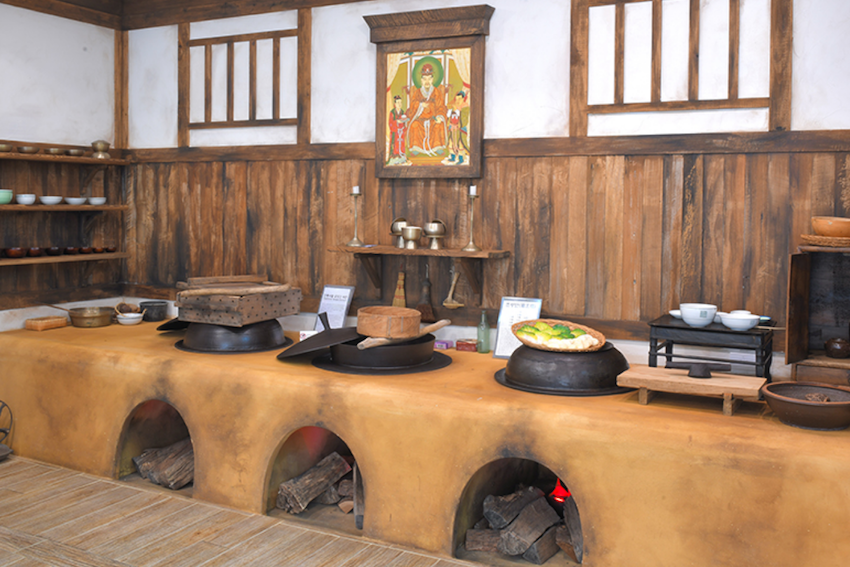
From one-day classes to monthly programs, the Korean Temple Food Center offers all the right tools, material and facilities to accommodate seekers of Korean culinary wisdom. Here’s an opportunity to learn seasonal plant-based temple food recipes, and get access to specialised books on temple food as well as a community space for events and gatherings. Learn more here.
4. Go for a Hike!

Hiking is a very popular activity in South Korea, best enjoyed during Spring and Fall when the scenery truly comes alive with colours, freshness and fragrance! Here are some hiking trails for you to explore. As a vegan, it’s advisable to carry your own food and drinks with you on a hike. Besides, you’re likely to find street vendors in the vicinity of several hiking trails, selling fruits, refreshing drinks, and a number of snacks, some of which are naturally vegan. Don’t miss the section below on ‘Accidentally Vegan Korean Street Foods’ to learn more!
5. Go on a Vegan Mini-Tour of Jeju Island
Matt from The Veganary hosts short vegan tours on the beautiful island of Jeju-Do. He offers a traditional tour that involves a farmers market visit, a Korean vegan buffet, followed by a tea ceremony, as well as a cafe-hopping tour. Find more details here and make sure to get in touch with him to learn more about his upcoming tours.
When in Jeju, also check out Green Bliss, a vegan clothing brand showroom that also has a vegan cafe and kid-friendly bookstore attached!
6. Spend Some Time at an Animal Shelter

There are some animal rescue groups and shelters in Korea working hard to put an end to the dog and cat meat trade in the country. Spending time with rescued animals can be a wonderful and fulfilling way to spend your free time, while making their day all the more enjoyable with your company! One such shelter is Empathy For Life, a no-kill animal shelter in Goyang city. Contact them to enquire about volunteering opportunities / visiting hours.
Eating Vegan in South Korea
And here we are – the most exciting yet nerve-wracking part of planning a trip to South Korea as a vegan. If you’re thinking: “Where do I eat and what do I eat?!” you’re definitely not alone. South Korea is indeed associated with heavy meat and seafood consumption, but the rapid pace at which vegan businesses are growing shows us that times are changing!
Navigating the vegan food scene in South Korea can be an enjoyable culinary quest as long as you go armed with knowledge and resources. In this section, we will explore numerous vegan restaurants, bakeries and shops all across the country, vegan street foods to try, as well as vegan products you can find in supermarkets.
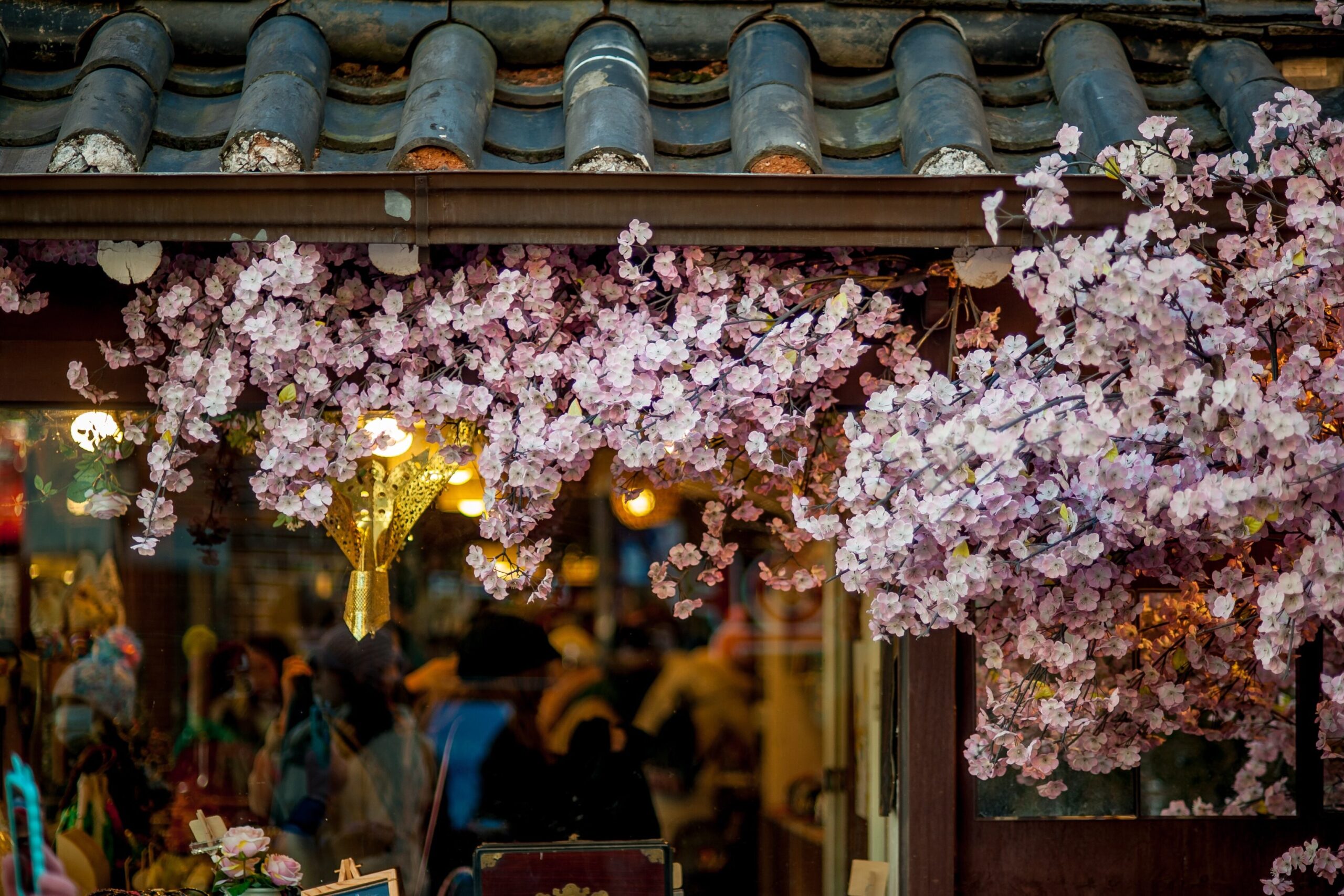
1. Restaurants
Home to 67 fully-vegan restaurants, Seoul is undoubtedly the best place for vegan restaurants in South Korea! This number is unmatched in other parts of the country. Having said that, it’s definitely still possible (and fun!) to travel all around as a vegan in South Korea.
Seoul
Here is a selection of fully vegan spots for you to explore some delightful local cuisine in the bustling capital city!
1. Maru JaYeonSik Kimbap (highly rated)
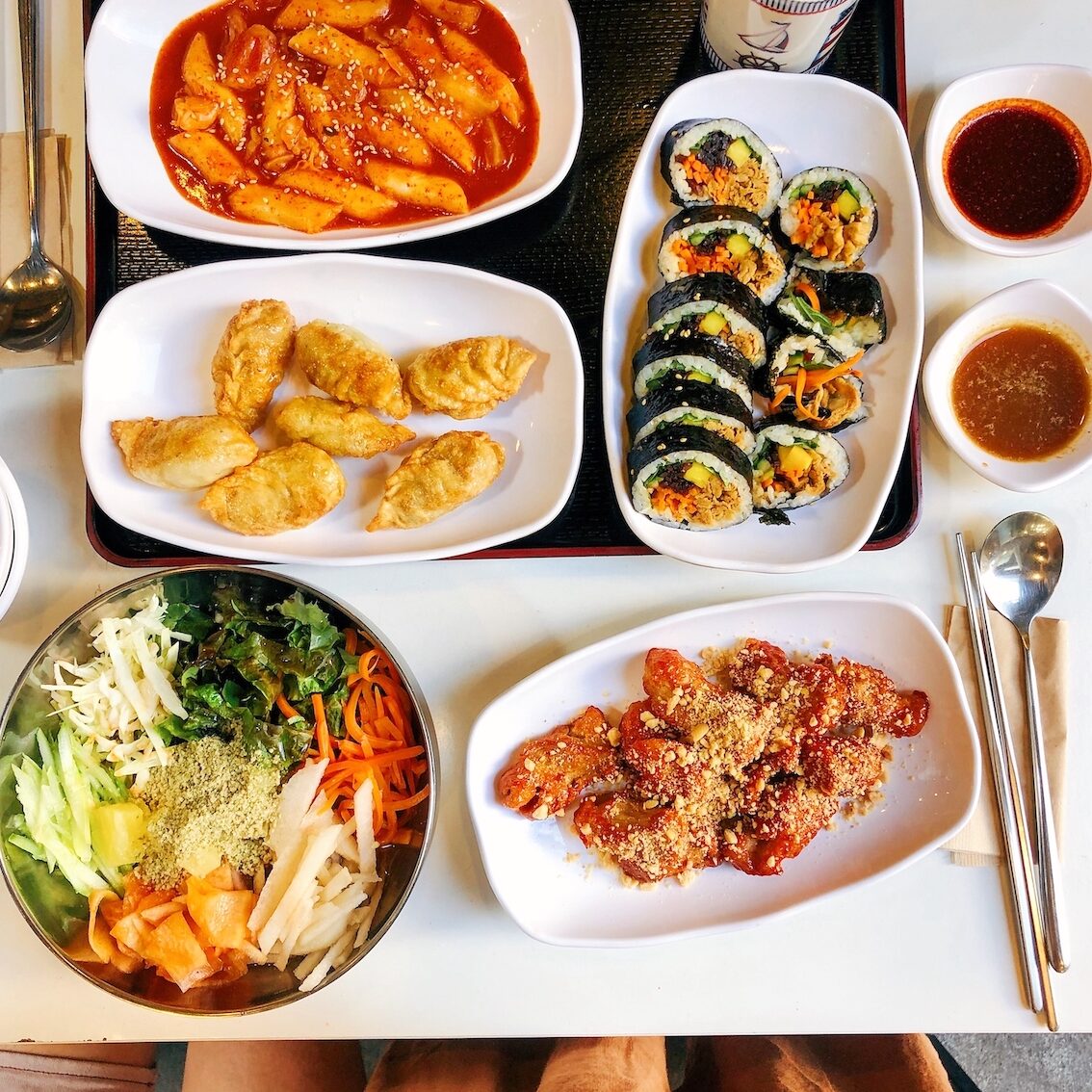
2. Han Gwa Chae – 한과채 (highly rated)

3. Vegan Kitchen – 비건 키친 (highly rated)
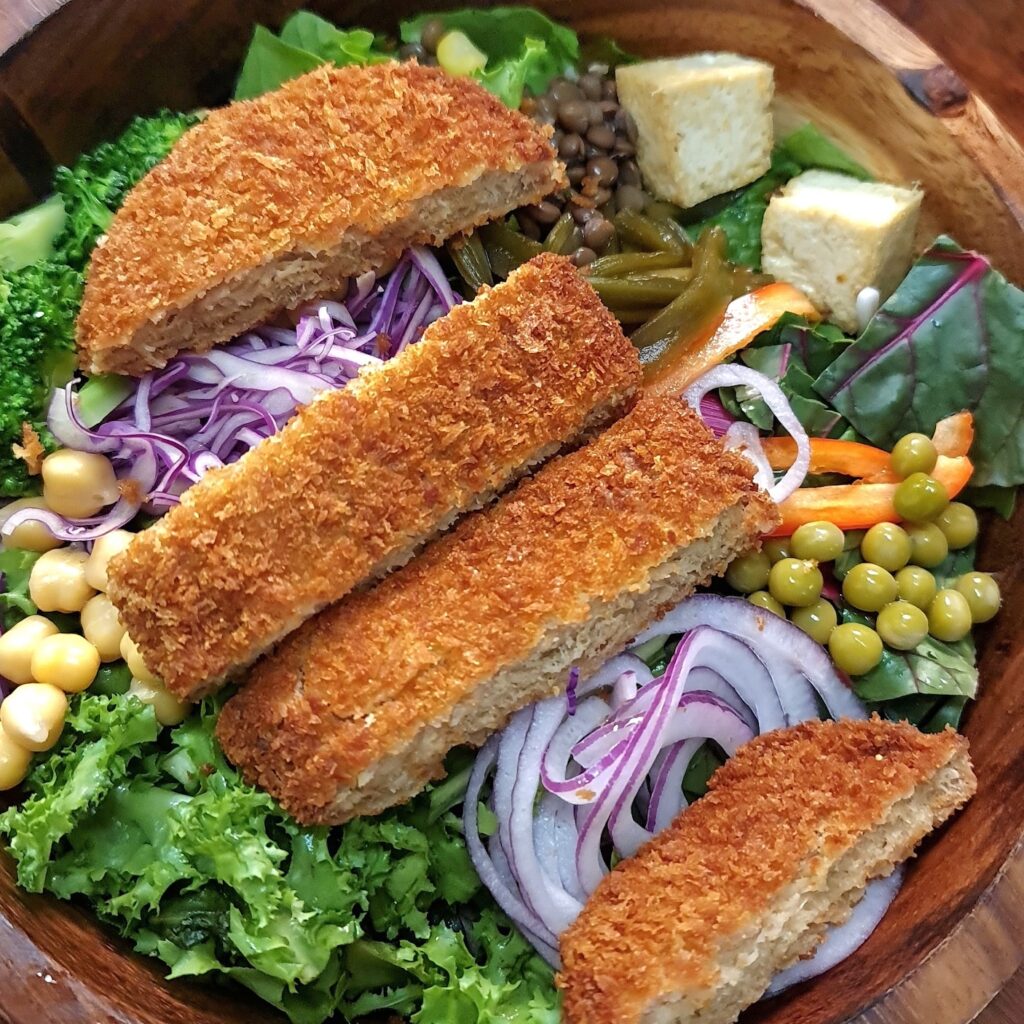

5. The Bread Blue – Nogosan (bakery)
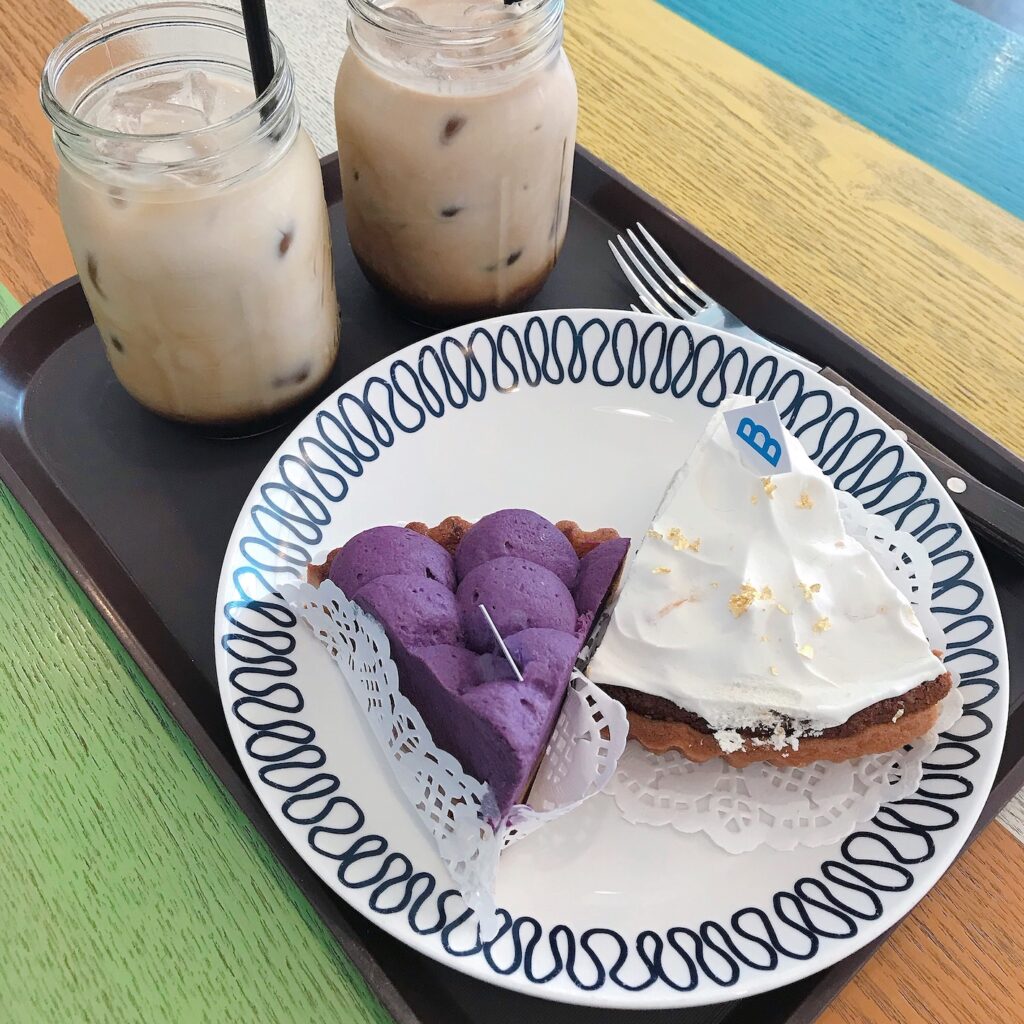
Also check out:
Guemokdang – Insadong 금옥당: A vegetarian store selling vegan Korean jelly bars (Yanggaeng 양갱), 99% of which are vegan.
Nosh Vegan: An all-vegan meal prep delivery service. Find more info here.
Search HERE to find hundreds (yes, hundreds!) of other vegan options in Seoul.
Busan
South Korea’s second most populous city, Busan, known for its beaches, mountains and temples, has close to 100 vegan-friendly restaurants. Here are some fully vegan ones of the lot:
1. Vegenarang (highly rated)
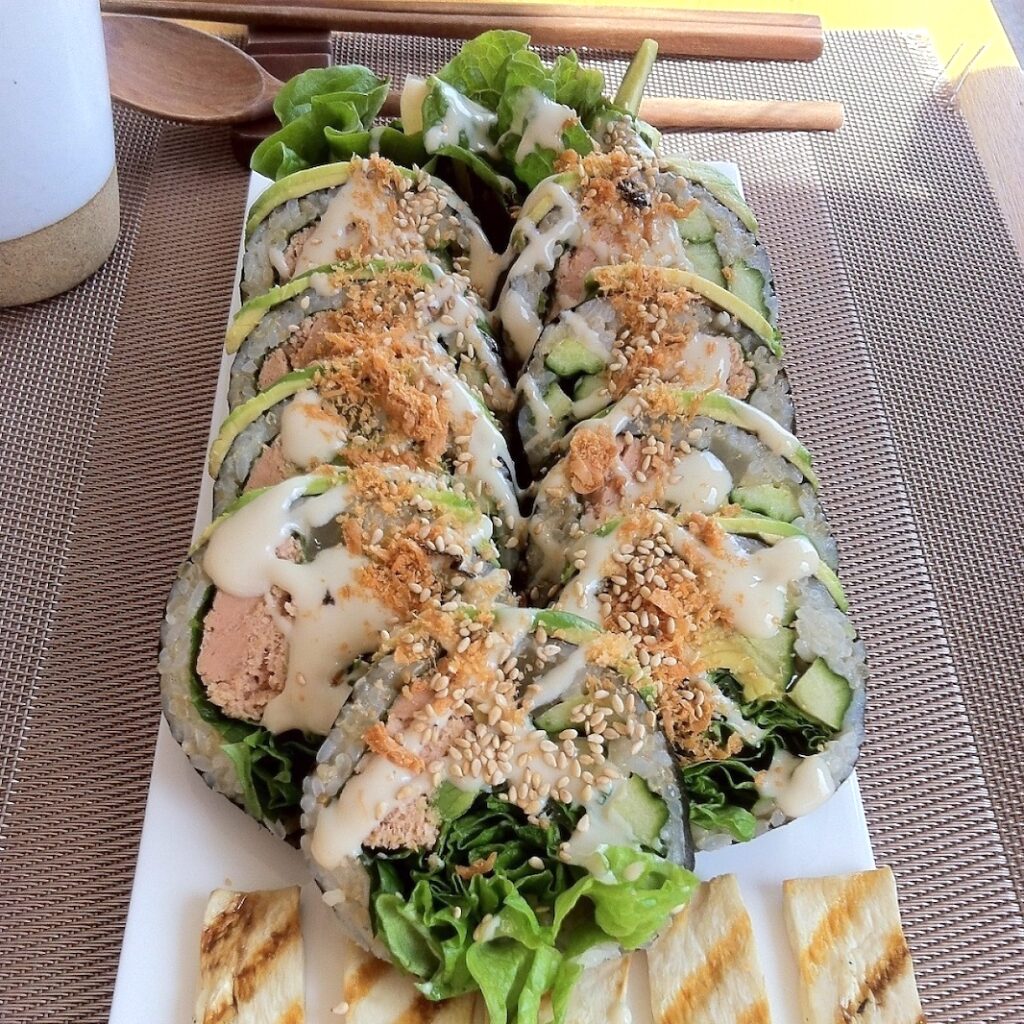
2. Soban Vegan 소반 비건식당 (highly rated)
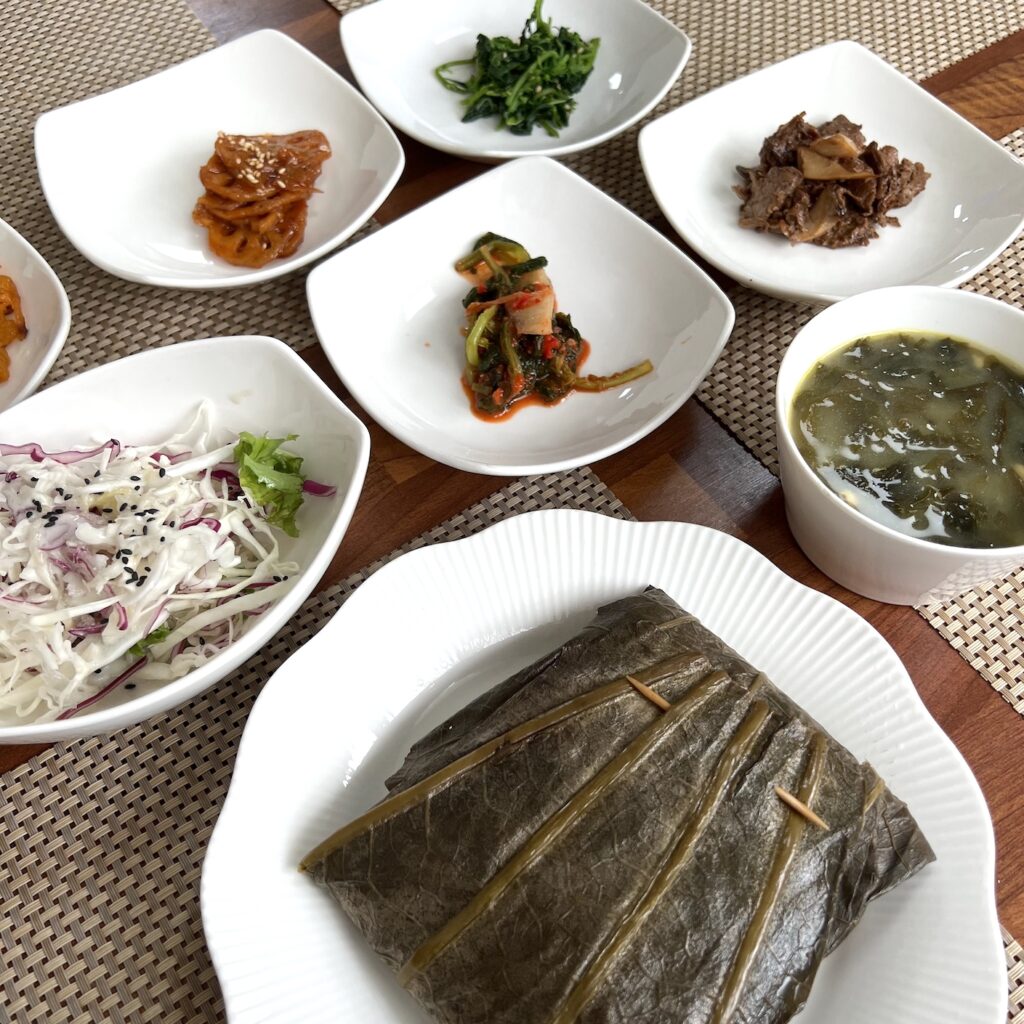
3. Nayuta Cafe (highly rated)
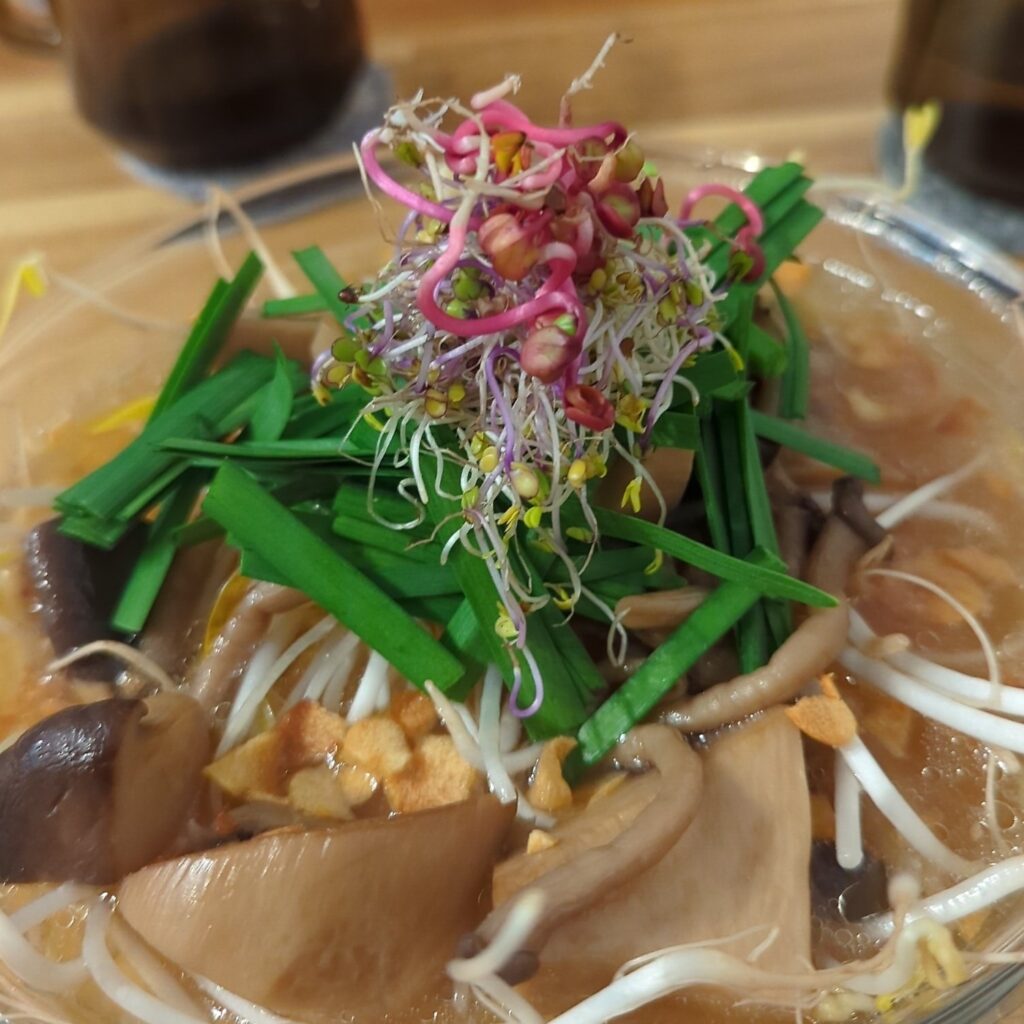
4. Obuthan (hidden gem)

5. Yaein Tea House – 예인찻집 (hidden gem)
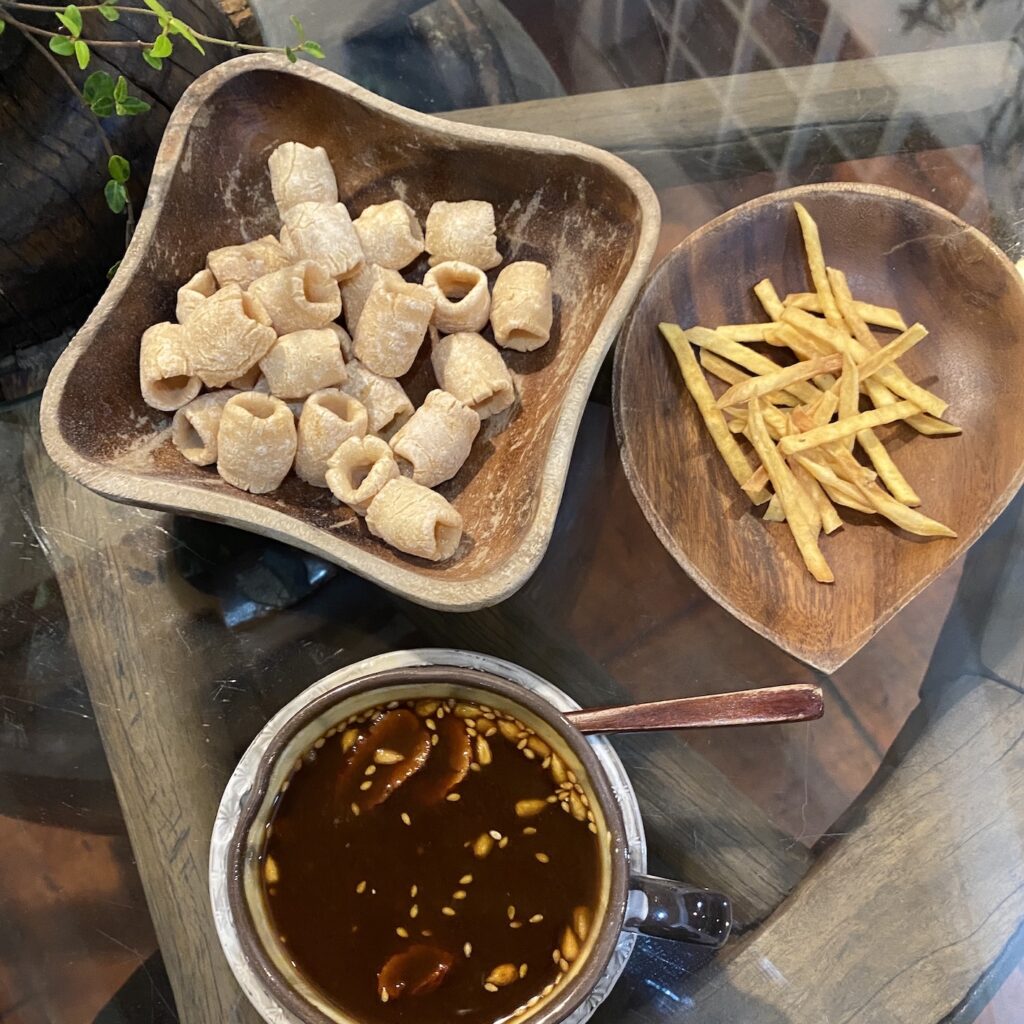
6. Joseon Snack 조선스낵 -Shinsegae branch (hidden gem)
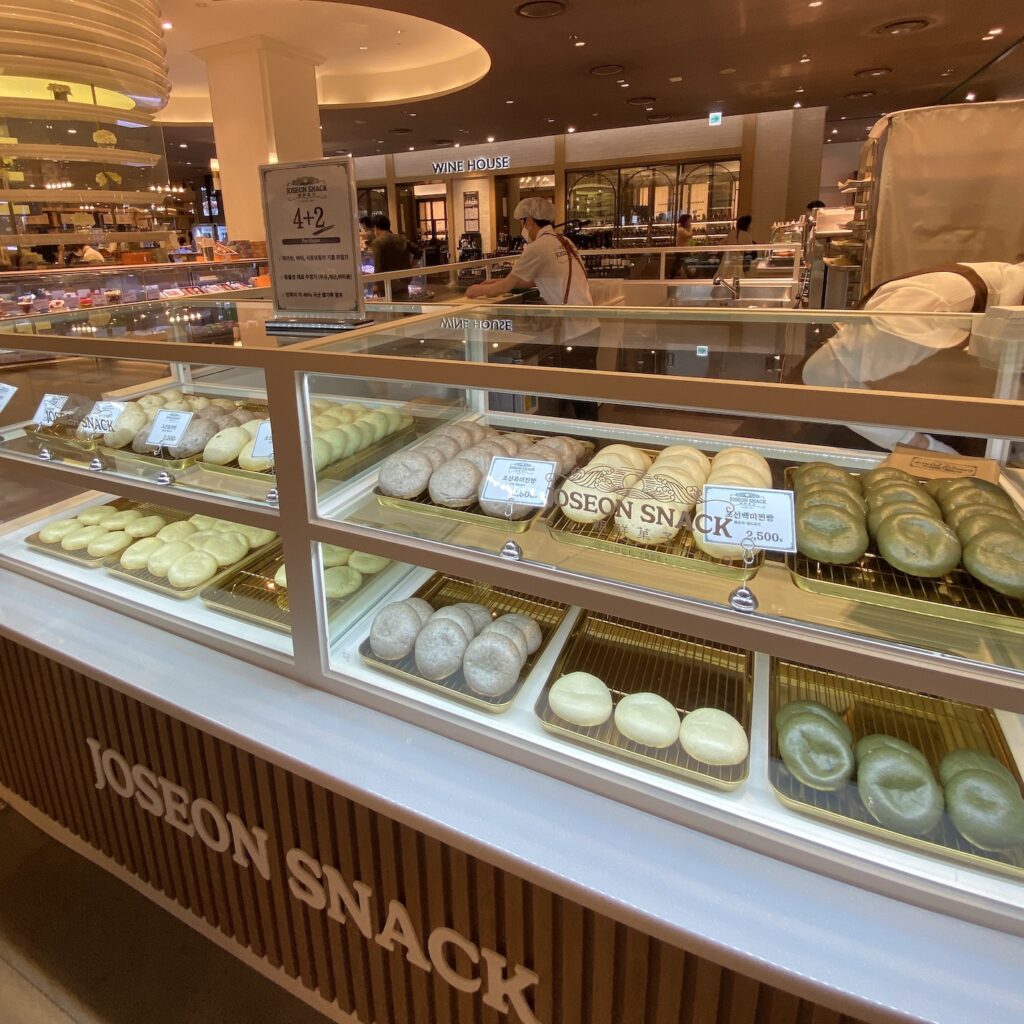
Find many more vegan options in Busan HERE.
Gyeongju
If you’re planning to visit this beautiful coastal city filled with cultural gems, don’t miss eating at these fully vegan places!
1. Baru (highly rated)
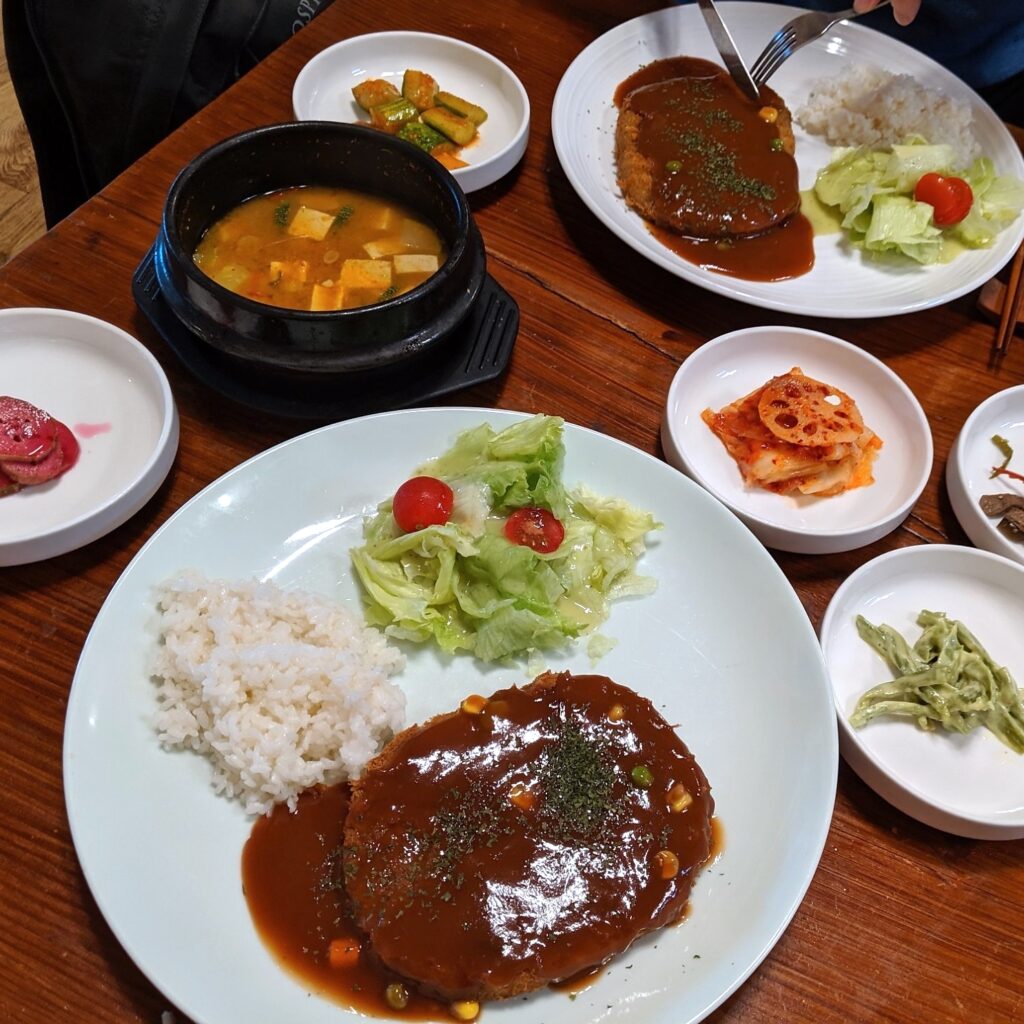
2. Hyangjeok Won – 향적원 (highly rated)
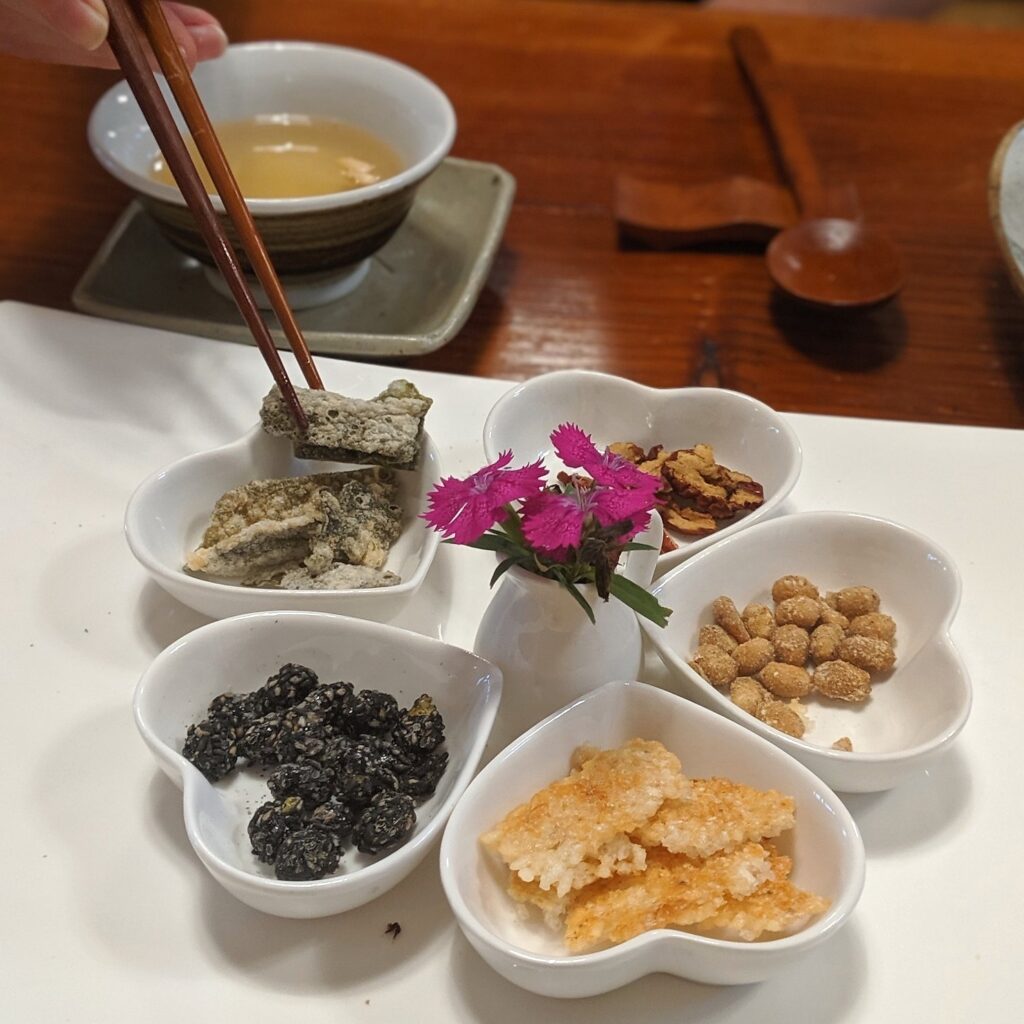
3. On-Ve Vegan Bakery 온비 비건베이커리 (bakery)

Explore more vegan-friendly restaurants in Gyeongju HERE.
Jeonju
Characterised by traditional houses, craft shops and food stalls, Jeonju is a charming city to visit! Besides, it has a few great vegan spots for you to try:
1. Gamloheon 감로헌 (highly rated)

2. Loving Hut (highly rated)

3. Dahwawon 다화원 (hidden gem)

Find the full list of vegan options in Jeonju HERE.
Daegu
Daegu, a city known for its nightlife and western music influences, has a couple of fully vegan cafes and shops:
1. Loving Hut – Peace Point (highly rated)
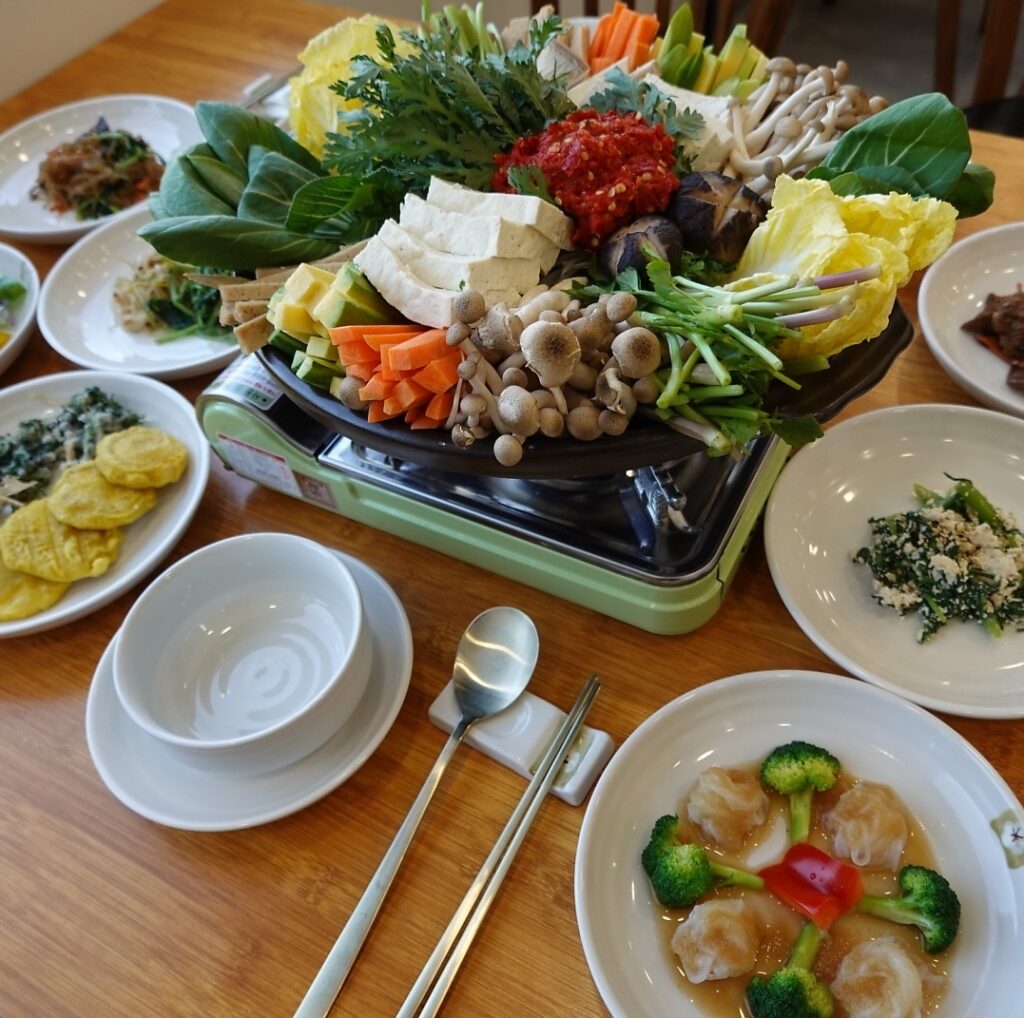
2. Dripper Baker (bakery)
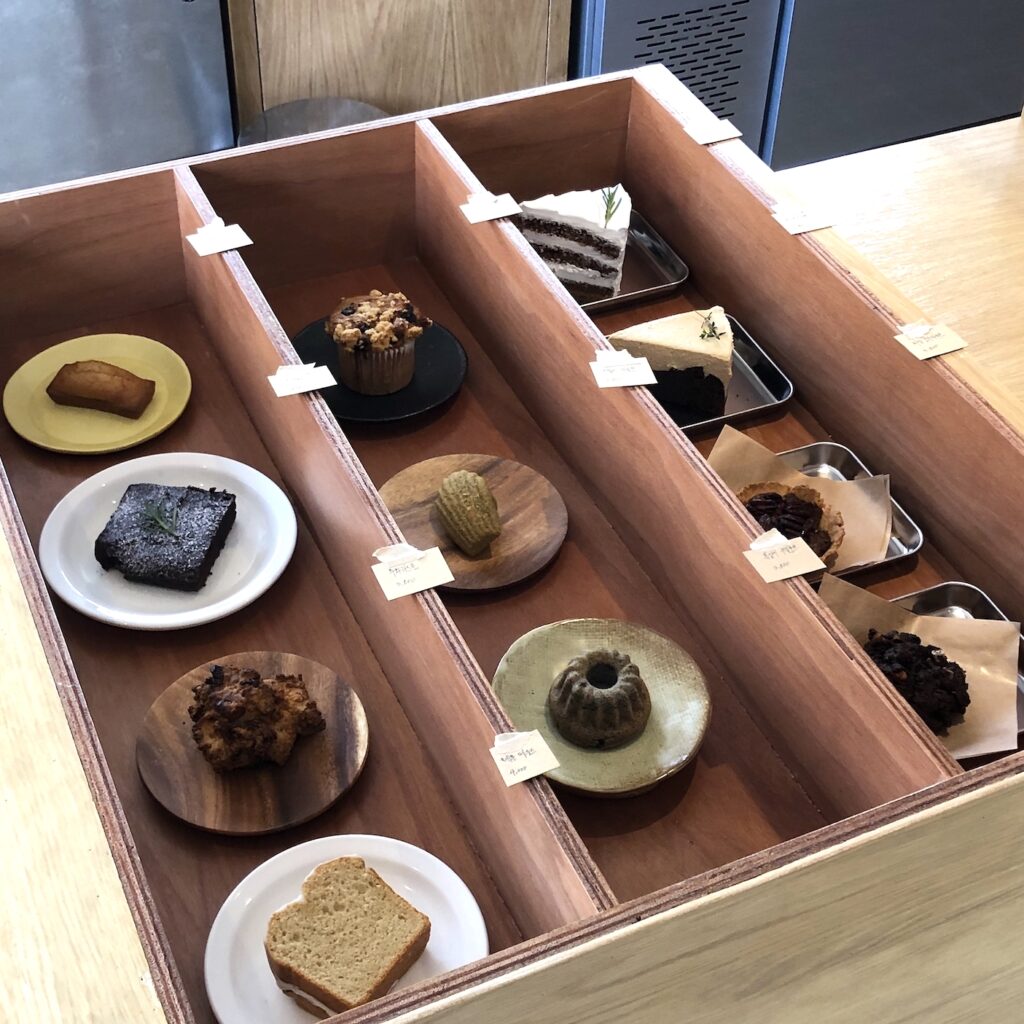
3. The Common (vegan shop + restaurant)
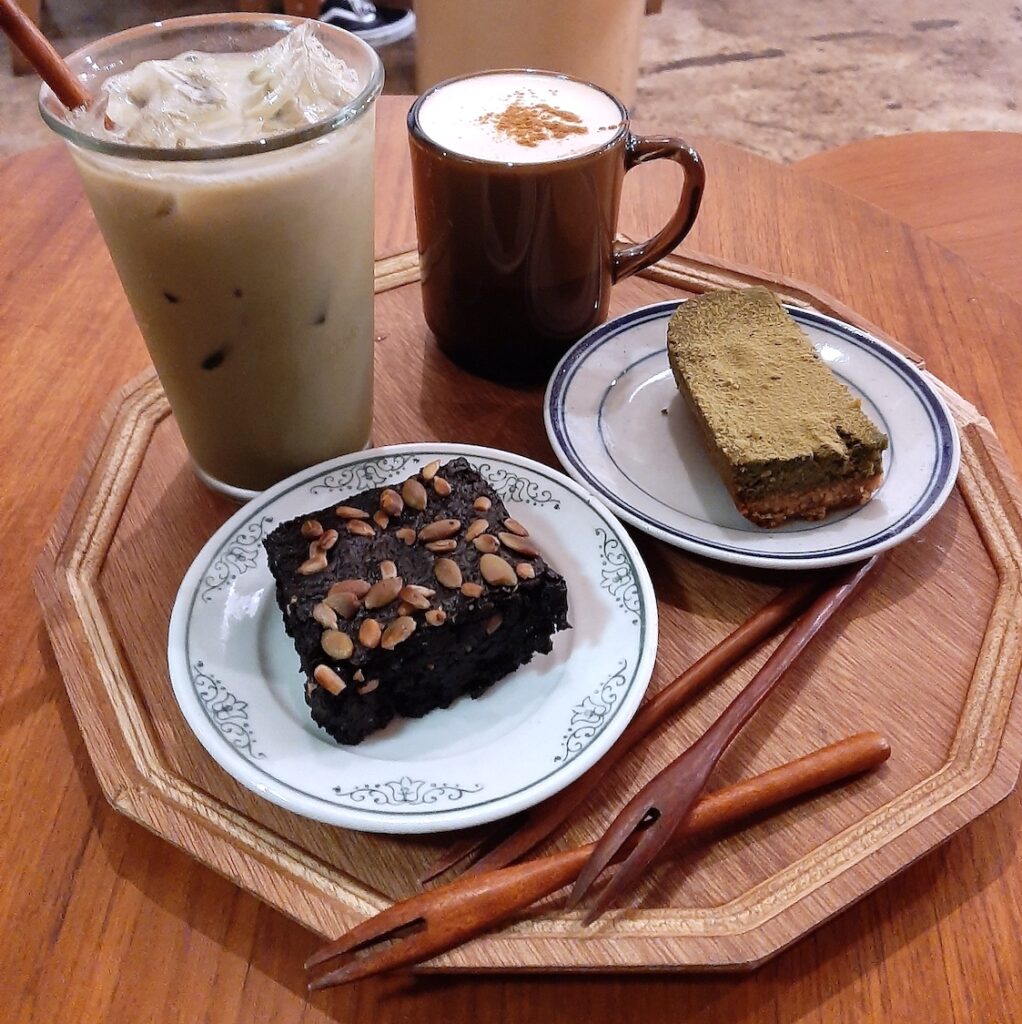
Look HERE for more vegan-friendly restaurants in Daegu.
Jeju
Jeju Island, a UNESCO World Heritage Site, is known as the “Hawaii of South Korea.” This volcanic paradise is undeniably one of the country’s most breathtaking destinations. With 83+ vegan-friendly places listed on HappyCow in Jeju, you can definitely enjoy this place as a vegan!
Here are some recommendations for you.
1. Santosha 산토샤 (highly rated)
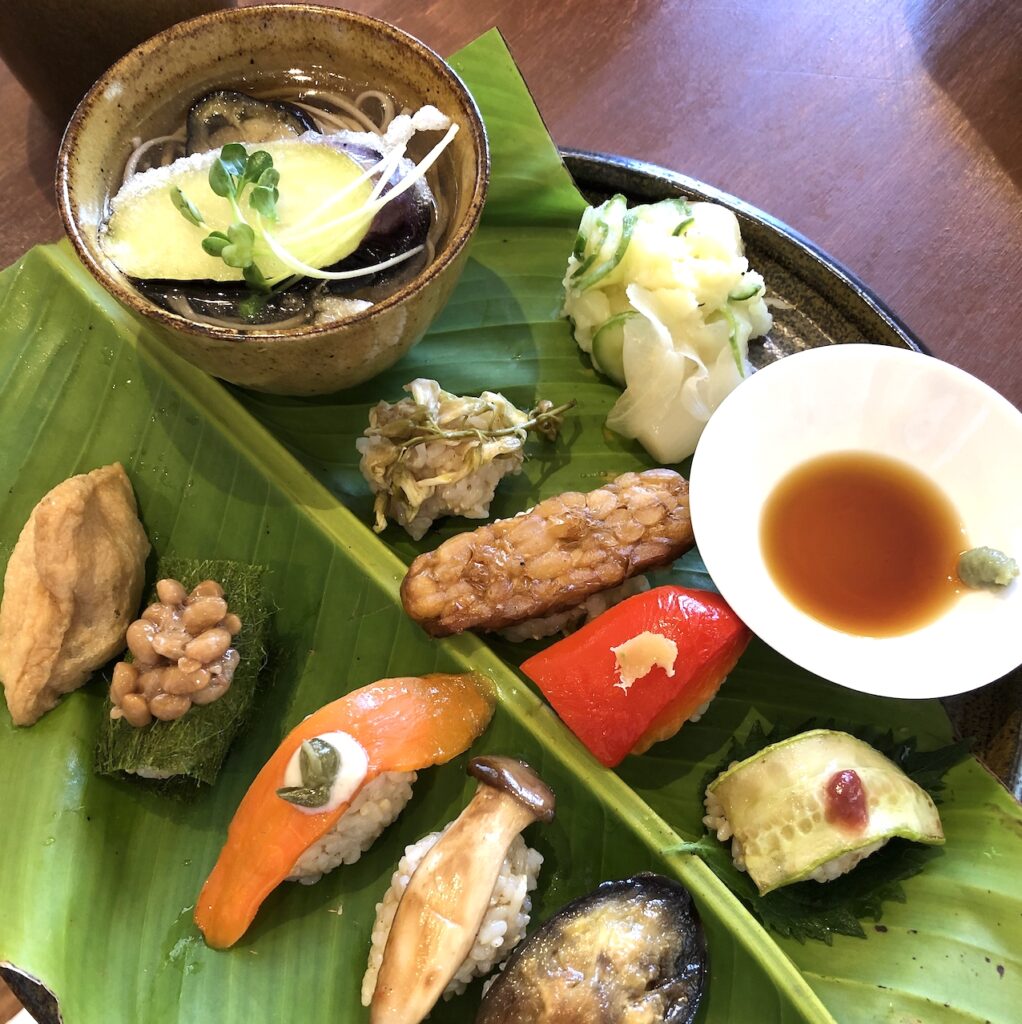
2. And 유 (Yu) Cafe (western food)
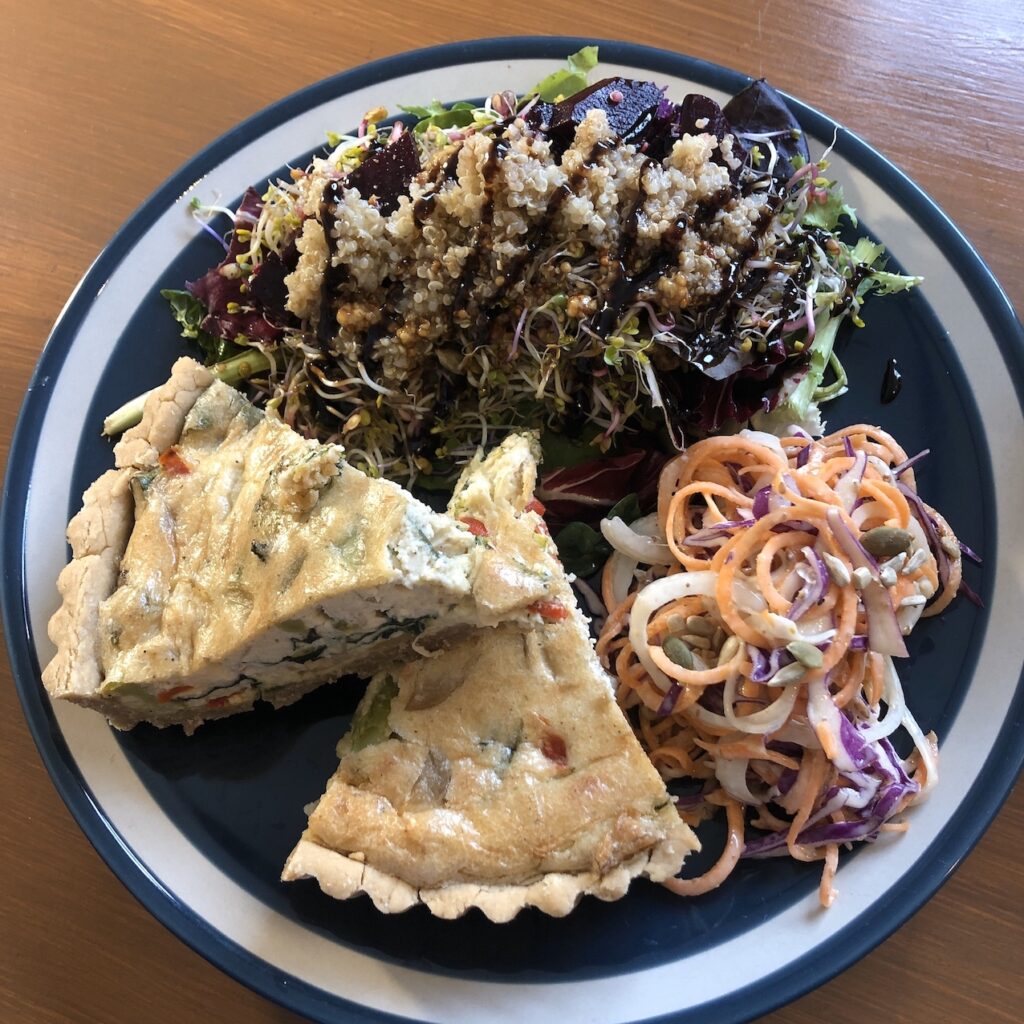
3. LouLou Vegan (bakery)

4. Lan’s Kitchen (hidden gem)

5. Jag Eunbueok 작은부엌 (hidden gem)
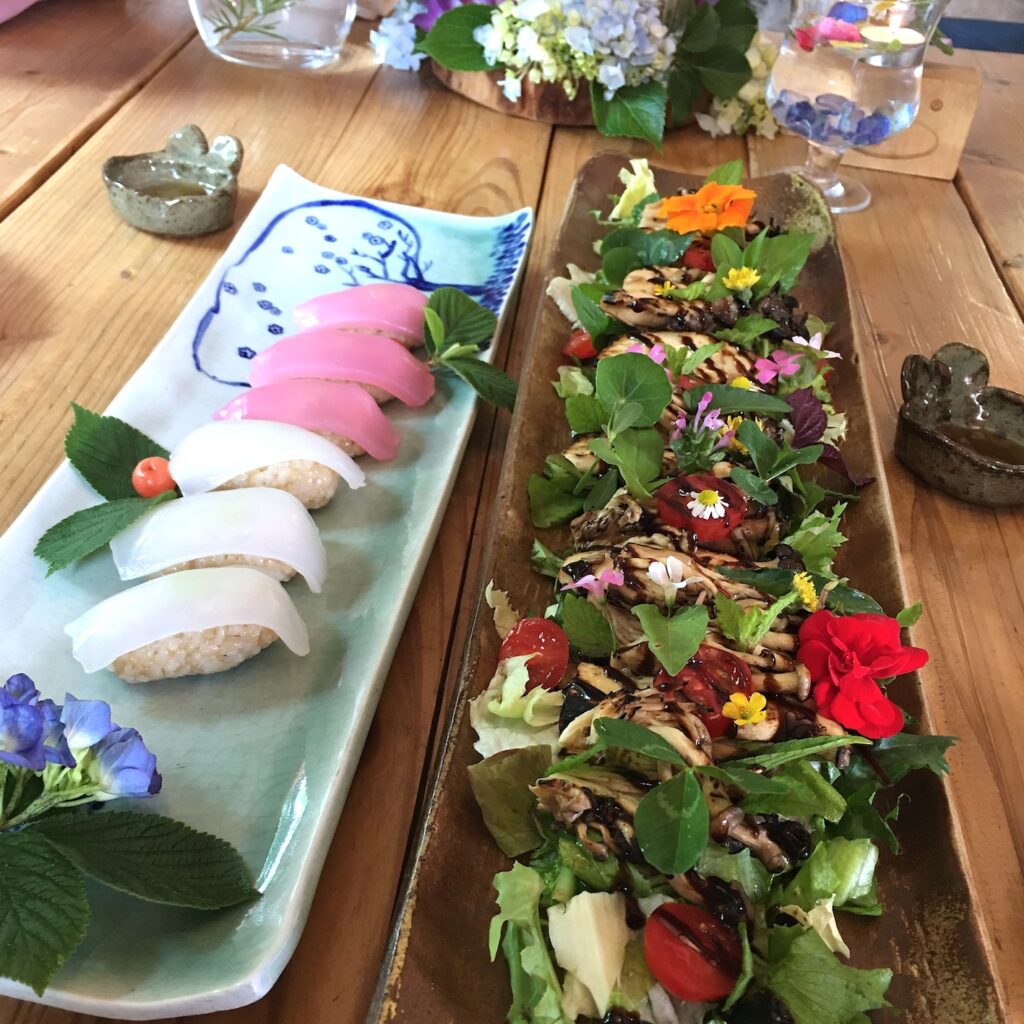
Also check out:
Market Origin – 마켓오리진: Organic market selling vegan brands such as the beyond burger and zero meat.
Green Bliss: A vegan clothing brand showroom that also has a vegan cafe and kid-friendly bookstore attached.
Search HERE for more vegan food in Jeju.
2. Street Food
Accidentally Vegan Korean Street Food: Try the Local Specialities!
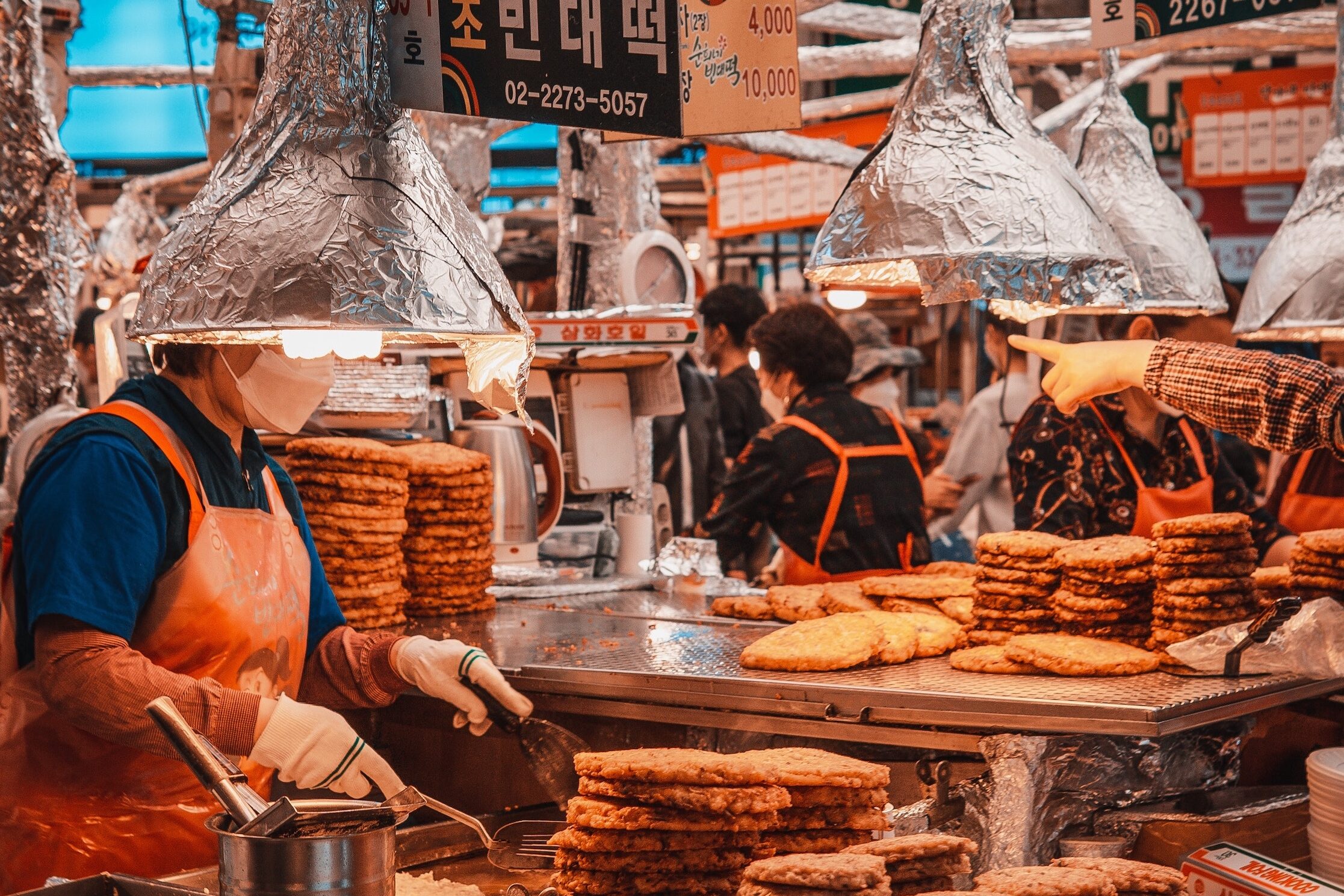
You’re in luck – because a lot of street food in Korea is naturally vegan! Besides, eating street food is an easy way to grab a quick bite. Most street food vendors are set up for you to eat on-the-go. However, the larger setups, known as pocha (포차), often come with basic seating and some shelter overhead.
In Seoul, there are a couple of locations that are particularly friendly towards vegans and vegetarians: Gwangjang Market (광장시장), Tongin Market (통인시장), Insadong (인사동), Hongdae (홍대) and Myeongdong (명동) are some of the places lined with food stalls that sell both traditional as well as modern Korean street food, some of which are vegan. Of course, you need to do some prior research on what is typically vegan and what can be easily veganised! Let’s help you with that.
Here are some of the ‘accidentally vegan’ street foods you must try if you get the chance!
Hobakjuk (pumpkin porridge)
Gamjajeon (potato pancake)
Kongguk (bean Soup)
Oksusu (steamed corn)
Hotteok (sweet cinnamon pancake)
Nurungji (crispy scorched rice crisps)
Gireum Tteokbokki (chewy chilli rice cakes)
Mattang (candied sweet potato)
Ddeok/Tteok (rice cake)
Kong gook su (soy milk noodle soup)
Susu bukkumi (pan-fried tteok)
Chapssaltteok (sweet red bean rice cake)
Songpyeon (another type of rice cake – ask to make sure there is no honey!)
These are some of the traditionally vegan snacks that you can find all over Korea. Always remember to watch out for hidden animal ingredients, even if these dishes are traditionally known to be vegan, as each food establishment will differ. The best way to be sure is to simply ask! Learn some simple Korean phrases here.
When it comes to main dishes, it helps to know that Bibimbap, Gimbap and Japchae can be veganised very easily.
And finally, be assured that there’s an abundance of fruit and vegetables in the street markets, so that is always an option for a vegan in South Korea.
3. Vegan Products at Supermarkets
You’re likely to find several vegan products at health food stores across South Korea.
Here are some examples of local vegan products available in supermarkets:
1. Plant based milk brands: Vegemil (black soy milk), Maeil (soy and almond milks), Sahmyook (soy, almond, and black bean drinks)
2. Ice creams: Jaws ice cream (shark-shaped vegan ice pops) and Natuur’s Cashew-Vanilla and Coconut-Pineapple flavours. Find more here!
3. Nongshim Sumi Chip original (sweet potato crisps)
4. Ppeongtwigi (corn and rice puffs)
5. Vegefood (variety of vegan meat substitutes)
6. Haitai Sweet Red Bean Jelly / Yongyanggaeng (red bean-flavoured jelly candy)
7. Pulmuone (vegan yogurt, seaweed snacks, etc.)
Besides local products, many health food stores and supermarkets also stock some western vegan products such as Violife vegan cheese and Beyond Meat.
Tips & Tricks for Before you Travel
This is to further equip you with useful knowledge and resources so you’re all set for your trip!

1. Watch-Outs: Hidden Animal Ingredients
Based on our recent Vegan in South Korea survey, we learnt that one of the main roadblocks to travelling as a vegan in this country is the prevalence of hidden animal ingredients in seemingly vegan dishes.
Here are some common animal-derived ingredients found in Korean cuisine:
Fish Sauce / Fish Oil (액젓, Aekjeot): Often used as a flavour enhancer in various Korean dishes like kimchi, stews, and sauces.
Anchovy Broth (멸치 육수, Myeolchi Yuksu): Sometimes used as a base for soups and stews, this broth is made from dried anchovies.
Oyster Sauce (굴 소스, Gul Soseu): This is made from oysters and is found in some stir-fried dishes and sauces. Always be sure to ask!
Dried Shrimp (건새우, Geon Saewu): Used in some side dishes and stews for added flavour. Sometimes it’s also used in the spicy red chilli sauce, Gochujang.
Animal Broths (육수, Yuksu): Broths made from meat or bones are common in many Korean soups and stews.
Egg (달걀, Dalgyal): Eggs are commonly used in various dishes, so it’s essential to check if a dish contains eggs or is prepared with them.
Honey (꿀, Ggul): Sometimes used as a sweetener in sauces and marinades.
Milk (우유, Uyu): Dairy products may be used in some desserts or baked goods.
Butter (버터, Beoteo): Used in certain dishes or baked goods.
Gelatin (젤라틴, Jellatin): Found in some desserts and snacks.
It’s crucial for vegans to communicate their dietary preferences when dining out in Korean restaurants and to ask about each specific ingredient. Additionally, being familiar with the local language or having a translated card explaining veganism can be helpful.
This leads us to the next section…
2. Useful Korean Phrases
Since veganism is becoming increasingly recognised by restaurants, especially in bigger cities, be assured that many places will understand your dietary needs. Having said that, it doesn’t hurt to familiarise yourself with a bit of the local language so you can feel confident and prepared for any situation!
Here are some phrases that would come in handy:
I’m vegan – 저는 채식주의자 입니다 (joneun chaesikjjuija imnida)
No fish oil – 생선기름 금지 (saengsongireum geumji)
No shrimp paste – 새우장 금지 (saeujang geumji)
Please do not add meat or fish – 고기와 생선은 넣지 말아 주세요 (gogiwa saengsoneun nochi mara juseyo)
I can eat vegetables, tofu, and mushrooms – 나는 야채, 두부, 버섯을 먹을 수 있습니다 (naneun yachae dubu bososeul mogeul ssu itsseumnida)
Temple food/cuisine – 사찰음식 (sa-chal uum-shik)
V-Cards is also an excellent resource that provides translations in over a 100 languages. Consider printing this out to hand to the waiter at any restaurant you dine at.

If the language barrier is still getting in the way, try to bridge the gap by using visual aids such as pictures of vegetables, tofu, and the vegan symbol.
And…when in doubt, use Papago Translate! Papago’s biggest advantage is its Korean roots. This makes the Korean translations much more accurate than other online translators.
3. Research Ahead of Time
A lot of Korean snacks and street foods are naturally vegan. Go through the previous section on ‘accidentally vegan street foods’ to learn the names of such foods. In addition, make sure to browse through vegan and vegan-friendly restaurants listed in South Korea on HappyCow and save the most exciting ones to your ‘trips’ (the little airplane icon) or to your ‘favourites’!
4. Save the Dates for Vegan Markets
Try to plan your trip around the dates of festivals and markets such as the Vegan Festival Korea as it’s another great way to connect with the local vegan community and other like-minded veggie folks.
5. Join Online Groups
Whether you have questions pre-travel or while you’re in Korea, online groups and forums can offer you a lot of support. Since some of these groups have existed for several years, you can go into their search bar and type a keyword related to something you want more information on, and it’s likely to pull up past discussions that are relevant.
Here are some helpful groups for you to join:
– Facebook groups: Vegan Korea · 채식 / Busan Veggie Club / Seoul veggie Club
– Subreddits: r/VeggieKorea / r/vegan_travel (search for “korea”)
– Meetups: Here is a Meetup group for vegans!
We hope this guide eases some of your concerns and answers all your questions about what it means to travel as a vegan in South Korea!
This guide was created in partnership with the Korean Tourism Organization (KTO).
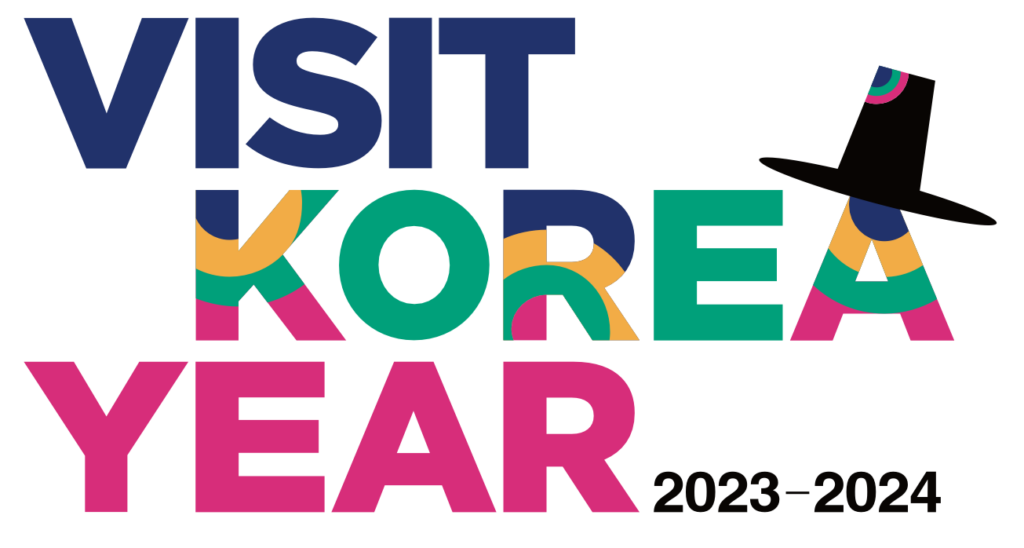

4 Comments
Dmitry (5 comments)
January 20, 2024 at 5:11 amIt so delightfully yummy as well as stunningly beautiful. I’d love to visit South Korea someday as it seems one of the best places in the world – advanced in all respects including food.
Evelyn (1 comments)
February 11, 2024 at 3:19 pmAs a member of the Korean diaspora, I want to thank you for featuring the motherland on your blog! Korean cuisine has many beautiful parts to it, and it’s great for folks who particularly enjoy spicy food!
Sara Brook (1 comments)
April 22, 2024 at 10:35 pmI just love Chinese food……….!
Rowan (2 comments)
September 3, 2024 at 12:54 pmSouth Korea is a fantastic destination for vegan travelers, offering a rich blend of cultural experiences and diverse plant-based cuisine. The traditional Korean diet, heavily influenced by Buddhist temple cuisine, has long embraced vegan practices, providing a unique culinary tradition that aligns with sustainable and ethical eating. Despite the prominence of meat and seafood in modern Korean cuisine, there are still numerous vegan and vegetarian options available, from traditional eateries to modern, Western-style vegan restaurants. Whether you’re exploring ancient temples or bustling city streets, there’s a delicious vegan meal waiting for you in South Korea!